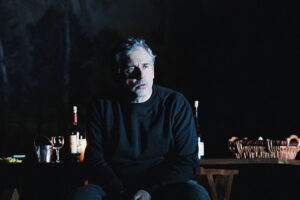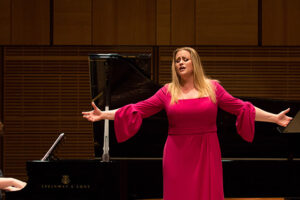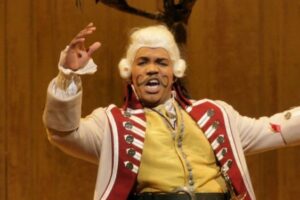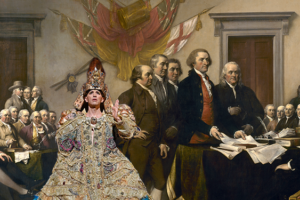

Skirball Hall, NYU’s concert venue on Washington Square, was the locale of Tuesday evening’s event. Whether because of the Arctic Vortex or some other reason—a lack of interest in bleeding chunks, a preference for a whole meal?—it was a half-empty house. But the singers were the usual mix of exceptional and passable and though the Teatro Grattacielo Orchestra could have used more rehearsal or just more energy, Israel Gursky led them with enthusiasm, visibly (but not audibly) singing along with several of his more ardent soloists, who were accompanied by the Cantori New York Chorus.
Part 1 of the program presented company stalwart Ashraf Sewailam as the blind old king Archibaldo, crooning amorously of the Italian peninsula conquered in his youth in Montemezzi’s L’Amore dei Tre Re, assisted by a fresh-voiced young tenor, Wesley Morgan.
This was followed by Act IV of Alfano’s Risurrezione, given in its entirety. The honors of this love-blooms-even-in-the-Gulag scene went to Stephen Gaertner, a Verdi-style baritone of great range and admirable polish, as the lovesick Simonson. Here the baritone actually wins the heart of Katiusha, the soaring soprano Kerri Marcinko, over the competition of the tenor, a resigned Raúl Melo.
Melo was really the hero of the evening, brought back twice and ever game, with an even if not lyrical sound over an exceptionally wide range (and you know what Verismo composers put their tenors through! And why Pertile and Del Monaco loved to sing these parts!). Melo was poignant, philosphical and depressed as Giosta Berling in Zandonai’s I Cavalieri di Ekebù, one of Grattacielo’s surprise triumphs all those years ago, and passionately amorous as Vassili in the love duet from Giordano’s Siberia (same Tolstoy story as Risurrezione with different names), blazing opposite Tiffany Abban, whose voluptuous soprano was strong and thrilling in lower registers, a bit wayward and ill-supported in the upper reaches.
The orchestra took on the Intermezzo from Mascagni’s Guglielmo Ratcliff (the only worthwhile portion of the score) and the rollicking overture to Wolf-Ferrari’s La Dama Boba, which had tunes a-plenty but seemed to fall apart mid-way, whether because Wolf-Ferrari was disorganized or the orchestra confused I could not say.
The first half of the program concluded with Act III of Leoncavallo’s Zazà, and here Teatro Grattacielo produced a pièce de résistance in the functional form of Aprile Millo, who sang the title role when the company presented it at Tully Hall. Millo’s top notes were often what Parterriani might describe as “pitchy,” but the middle and lower two-thirds of her soprano were full-throttle, on point and very beautiful, and in their sheer grandeur reminded us what the spinto repertory has been missing all these years. She sang with commitment and emotive power, showing these youngsters how the game should be played.
Millo was ably seconded by Megan Monaghan, whose soprano flowered as her confidante, Natalia. A young lady named Amerberdawn Scarborough spoke the lines of Toto, the daughter of Zazà’s married lover. As in Tully Hall, Teatro Grattacielo had this role’s lines spoken through a microphone. I found this unnecessary, and it robs the relationship of the diva and the child of much of its poignancy.
Millo returned in the second half to sing the apotheosis of the martyred saint of music in Refice’s Cecilia, a role she clearly hopes to sing one day. (Trivia: Name three other opera composers who, like Refice, were priests.) I heard Renata Scotto do Cecilia at Fisher Hall with an extraordinary combination of bitter resignation and innocent, Suor-Angelica-like ecstasy, and Millo too worked that vein with some delicious phrases but less of an astonished joy.
Stefanos Koroneos contributed an aria from Respighi’s Belfagor, a buffo tenor order of all the foods he expects to be waiting for him when he gets home to feast. If there was humor or desire in the music, Koroneos did not provide it for us, and the occasion fell quite flat. I hope Belfagor, a score I do not know, holds other delights.
Monaghan’s lovely soprano was heard again to advantage in the evening’s concluding selection, the finale with chorus (and all the other soloists joining in), to Wolf-Ferrari’s Il Campiello, which was heard last month in Firenze and is, if the melody of this number is proper evidence, an excellent choice for the sort of revival we, the devoted, look forward to from Teatro Grattacielo.























Comments